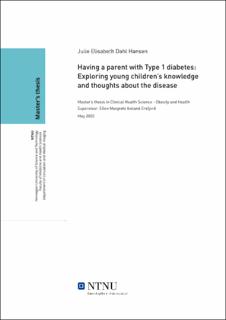| dc.contributor.advisor | Kulseng, Bård Eirik | |
| dc.contributor.author | Hansen, Julie Elisabeth Dahl | |
| dc.date.accessioned | 2021-09-25T16:16:58Z | |
| dc.date.available | 2021-09-25T16:16:58Z | |
| dc.date.issued | 2020 | |
| dc.identifier | no.ntnu:inspera:54082640:34934723 | |
| dc.identifier.uri | https://hdl.handle.net/11250/2782687 | |
| dc.description.abstract | Sammendrag
Bakgrunn: Det mangler forskning på små barns opplevelser av å ha en forelder med type 1 diabetes (T1D). Barn har i henhold til barnekonvensjonen rett til å uttrykke seg om saker som angår dem. Likevel inkluderes ikke norske barn av foreldre med T1D i pårørendeundervisning, med mindre forelderen etterspør det. Det er viktig å erverve kunnskap om hvordan yngre barn opplever å ha en forelder med T1D.
Mål: Målet med denne studien var å undersøke unge norske barns (5-8 år) kunnskap og tanker om å ha en forelder med T1D, i forhold til om de bør inkluderes i pårørendeundervisning.
Metode: For å utforske barnas perspektiver ble det anvendt en kvalitativ tilnærming, inspirert av metoder ofte brukt innen barndomssosiologien. Metodene brukt var brainstorming, assosiasjonsoppgave, kroppskart- og diabetesutstyr og kostholdsoppgave. Semistrukturerte intervjuguider ble også utviklet til de deltakerbaserte oppgavene. Barna inkludert i studien var mellom 5-8 år gamle, og hadde minst en forelder med T1D. Tolv barn deltok i studien, seks gutter og seks jenter. Tematisk analyse ble brukt for å analysere dataene.
Resultater: Alle barna hadde kunnskap om forskjellige aspekter ved T1D, med forskjellig bredde angående to hovedtemaer: (a) kunnskap om medisinsk utstyr og sykdomsmekanismer, (b) kunnskap om forholdet mellom T1D, kosthold (sukker) og potensielle komplikasjoner. Barnas kunnskap var ikke aldersrelatert, og noen av barna hadde dybdekunnskap om sykdommen. Deres kunnskap virket å være relatert til hvordan og hva forelderen lærte dem om T1D, barnets individuelle nysgjerrighet og interesse, og forelderens historie med fluktuerende blodsukker-verdier. Forelderens sykdom påvirket flere av barna og deres hverdag, noe som førte til bekymringer om forelderens sykdom hos to av de eldste barna.
Konklusjon: Funnene tyder på at små barn bør involveres i pårørendeundervisning. Informasjon om T1D kan trolig gi barn en større følelse av kontroll og delaktighet, i tillegg til mestringsstrategier for å håndtere forelderens diagnose. Det bør også utvikles et rammeverk for hvordan barn skal involveres i pårørendeundervisning angående T1D. Rammeverket bør baseres på kunnskap fra denne og fremtidige studier innen fagfeltet, i tillegg til innsikter fra barndomssosiologien og annen forsking på barns perspektiver om helse og sykdom. | |
| dc.description.abstract | Summary
Background: Research on young children’s experiences of having a parent with Type 1 diabetes (T1D) is lacking. According to the UN Convention on the Rights of the Child, children have the right to express their opinions about matters that affect them. Even so, children in Norway are only included in next of kin education if requested by the parent who suffers from T1D. It is important to gain knowledge about how younger children cope with having a parent with T1D.
Aim: The aim of this study was to explore young Norwegian children’s (5-8 years old) knowledge and thoughts about having a parent with Type 1 diabetes (T1D), and whether they should be involved in next of kin education.
Methods: A qualitative approach, inspired by methods often used within the sociology of children and childhood, and participatory, child-friendly methods adjusted to the children’s age group, were developed to explore the children’s views. The methods used were brainstorming, association exercise, body map and diabetes supplies, and a diet exercise. Semi-structured interview guides to all participatory tasks were also developed. Children included in the study were between 5-8 years old, and had at least one parent with T1D. Twelve children participated, six boys and six girls. Thematic analysis was used to analyze the data set.
Results: All the children had knowledge about different aspects regarding T1D, with different breadth about two main topics: (a) knowledge about medical equipment and disease mechanisms, (b) knowledge about the relationship between T1D, diet (sugar), and potential complications. I found that children’s knowledge was not age-related, and that some children had in-depth knowledge about the disease. Their knowledge seemed related to how and what the parents taught them about T1D, to the individual child’s curiosity and interest, and the parent’s histories with fluctuating blood sugar levels. Several children were affected by their parents’ diabetes in their daily life, leading to worries about their parent’s disease in two of the oldest children.
Conclusion: These findings suggest a need for involvement of young children in next of kin education. Information about T1D might give children a greater sense of control and agency as well as coping strategies to deal with their parent’s diagnosis. Additionally, these findings suggest a need for the development of a framework on how to involve children in next of kin education about T1D. This framework should be built on knowledge from this study and future research within this topic, as well as establishing insights from social studies of children and childhood and other research on children’s perspectives on health and illness. | |
| dc.language | eng | |
| dc.publisher | NTNU | |
| dc.title | Having a parent with Type 1 diabetes: Exploring young children’s knowledge and thoughts about the disease | |
| dc.type | Master thesis | |
